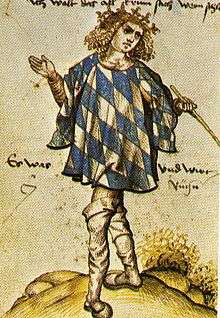Herald





A herald, or, more correctly, a herald of arms, is an officer of arms, ranking between pursuivant and king of arms. The title is commonly applied more broadly to all officers of arms.
Heralds were originally messengers sent by monarchs or noblemen to convey messages or proclamations—in this sense being the predecessors of the modern diplomats. In the Hundred Years' War, French heralds challenged King Henry V to fight. During the Battle of Agincourt, the English herald and the French herald, Montjoie, watched the battle together from a nearby hill; both agreed that the English were the victors, and Montjoie provided King Henry V, who thus earned the right to name the battle, with the name of the nearby castle.[1]
Like other officers of arms, a herald would often wear a surcoat, called a tabard, decorated with the coat of arms of his master. It was possibly due to their role in managing the tournaments of the Late Middle Ages that heralds came to be associated with the regulation of the knights' coats of arms. Heralds have been employed by kings and large landowners, principally as messengers and ambassadors. Heralds were required to organise, announce and referee the contestants at a tournament.[2] This science of heraldry became increasingly important and further regulated over the years, and in several countries around the world it is still overseen by heralds. Thus the primary job of a herald today is to be an expert in coats of arms. In the United Kingdom heralds are still called upon at times to read proclamations publicly; for which they still wear tabards emblazoned with the royal coat of arms.
There are active official heralds today in several countries, including the United Kingdom, the Republic of Ireland, Canada, and the Republic of South Africa. In England and Scotland most heralds are full-time employees of the sovereign and are called "Heralds of Arms in Ordinary". Temporary appointments can be made of "Heralds of Arms Extraordinary". These are often appointed for a specific major state occasions, such as a coronation. In addition, the Canadian Heraldic Authority has created the position of "Herald of Arms Emeritus", with which to honor long-serving or distinguished heraldists. In Scotland, some Clan Chiefs, the heads of great noble houses, still appoint private officers of arms to handle cases of heraldic or genealogical importance of clan members, although these are usually pursuivants.
English Heralds
English Heralds of Arms in Ordinary
- Richmond Herald of Arms in Ordinary
- Chester Herald of Arms in Ordinary
- Lancaster Herald of Arms in Ordinary
- York Herald of Arms in Ordinary
- Somerset Herald of Arms in Ordinary
- Windsor Herald of Arms in Ordinary
English Heralds of Arms Extraordinary
- Arundel Herald of Arms Extraordinary
- Beaumont Herald of Arms Extraordinary
- Maltravers Herald of Arms Extraordinary
- New Zealand Herald of Arms Extraordinary
- Norfolk Herald of Arms Extraordinary
- Surrey Herald of Arms Extraordinary
- Wales Herald of Arms Extraordinary
Scottish Heralds
Scottish Heralds of Arms in Ordinary
- Albany Herald of Arms in Ordinary
- Marchmont Herald of Arms in Ordinary
- Rothesay Herald of Arms in Ordinary
- Snawdoun Herald of Arms in Ordinary
Scottish Heralds of Arms Extraordinary
- Angus Herald of Arms Extraordinary
- Islay Herald of Arms in Extraordinary
- Orkney Herald of Arms Extraordinary
- Ross Herald of Arms Extraordinary
Canadian Heralds
Canadian Heralds of Arms In Ordinary
- Chief Herald of Canada
- Assiniboine Herald of Arms in Ordinary
- Athabaska Herald of Arms in Ordinary
- Coppermine Herald of Arms in Ordinary
- Fraser Herald of Arms in Ordinary
- Miramichi Herald of Arms in Ordinary
- Saguenay Herald of Arms in Ordinary
- Saint-Laurent Herald of Arms in Ordinary
Canadian Heralds of Arms Extraordinary
- Albion Herald of Arms Extraordinary
- Capilano Herald of Arms Extraordinary
- Cowichan Herald of Arms Extraordinary
- Dauphin Herald of Arms Extraordinary
- Niagara Herald of Arms Extraordinary
- Rouge Herald of Arms Extraordinary
Canadian Heralds of Arms Emeritus
- Outaouais Herald of Arms Emeritus
- Rideau Herald of Arms Emeritus
Indian Empire Herald of Arms Extraordinary
See also
- Heraldry
- Officer of Arms
- The College of Arms
- The Court of the Lord Lyon
- The Canadian Heraldic Authority
- Town crier
References
- ↑ Keegan, John. The Face of Battle, 1983, Penguin Classics, ISBN 0-14-004897-9, pp 74, 77, 104-105
- ↑ The Historical Atlas of Knights and Castles, Dr Ian Barnes, 2007 pp.176&177.
External links
| Look up herald in Wiktionary, the free dictionary. |
- The Court of the Lord Lyon
- The College of Arms
- The Canadian Heraldic Authority
- The Office of the Chief Herald of Ireland
- Genealogy & Heraldry Bill, 2006 Introduced in the Irish Senate to provide a sound legislative basis for Ireland's heraldic authority.
